Early morning, the shadows still long, but you can already feel the warmth building. Our motel was across the road from the historic homestead where Henry Williams' family lived. The evening before, we wandered around the gardens, reading the plaques and enjoying the close proximity to the history of the missionary who translated the original English treaty into Te Reo.
Before you get all up in arms about the issues that those two versions are still causing, from what I can see, Williams had good intentions. New Zealand was quite lawless then, and he wanted the treaty to protect Māori from the ungoverned savages.
Henry and his son were given just one night to translate the draft treaty's technical language into Māori. To be fair to the man, all these years later, some still find it hard to understand the concepts in those documents, or dare I say it, the principles.
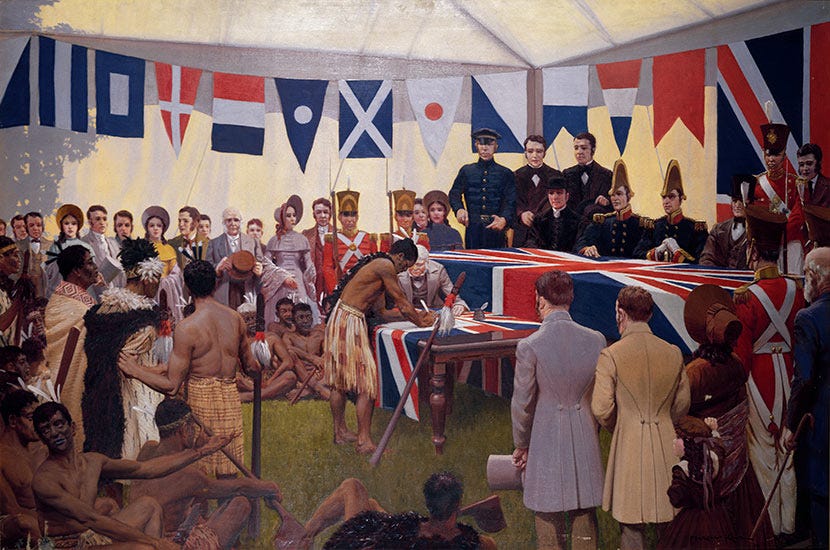
On February 5th, Williams played a crucial role in explaining the Treaty to the chiefs. Considering the historical time, I think it’s a remarkable document, and I’m sure he could’ve done better if he hadn’t just had the one night.
As we walked along the road, the bay was stunning. The islands, yachts, an enormous cruise ship off the coast, a navy vessel, and the waka lined up and ready. Some folks slept on the beach. One fella popped his head out from a sleeping bag and lit a cigarette as he lay on the sand. We reached the end of the road and crossed the bridge to Waitangi proper.
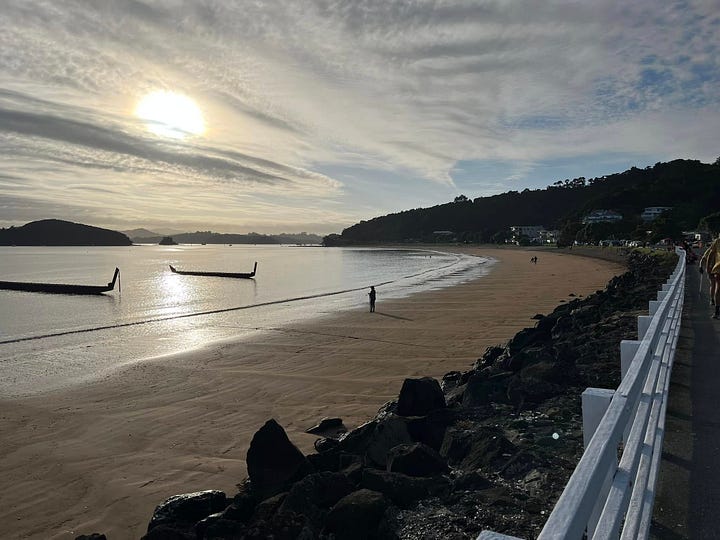
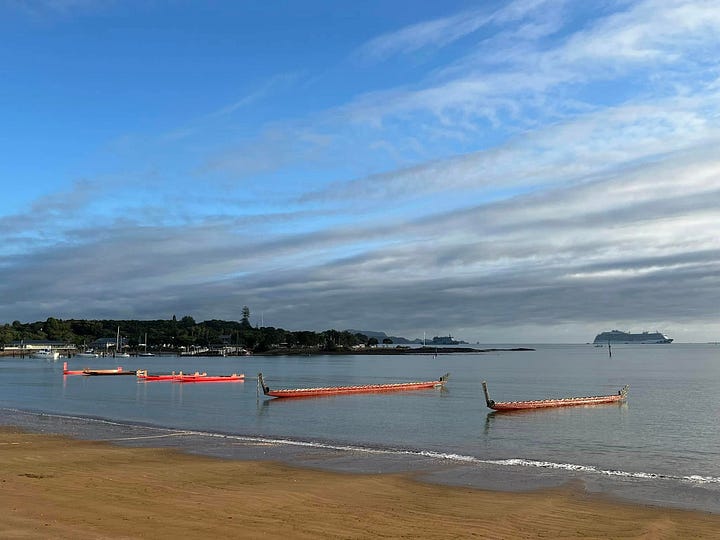
Most of the buildings were closed and reserved for dignitaries and politicians. Walking through the trees to the forum tent, where political discussions were held throughout the day, it felt very peaceful.
“Waitangi is not a holiday,” declared the lady from the stage. We’d taken a seat to listen, having purchased Toitū Te Tiriti shirts, which we changed into in the already odorous portaloos. “What is our vision for our descendants?” she asked.
Next, Margaret Mutu spoke about constitutional transformation. She explained how she and Moana Jackson had engaged with people across the country, asking them what it would look like if they could shape the way the world is. What values should underpin our constitution? Not mere tinkering, she said, but fundamentally, what do we want? What should it look like?
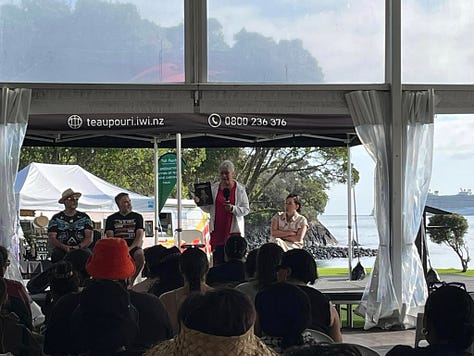
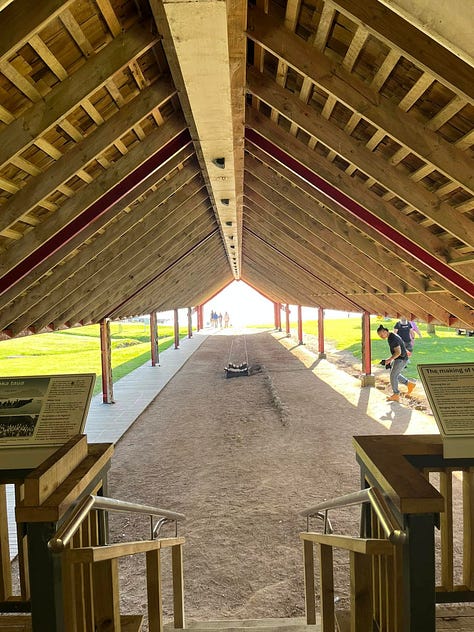
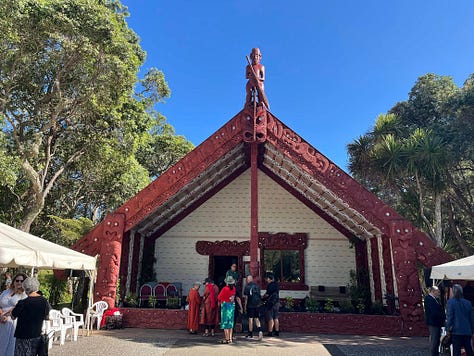
It was a hot, steep walk to the upper treaty grounds; the sun was scorching by now high in the sky, with scarcely a breath of wind. We made our way to Te Whare Runanga, the small meeting house you’ll have seen if you’ve watched the dawn service televised.
We found a place to sit, and I spotted a familiar figure just in front of us: the former MP Tau Henare, who lives in our suburb. I popped over to say hello and, for my troubles, received a hongi.
Tau spoke about his grandfather and Labour MP Peeni Henare's grandfather being brothers and laughed at my comment that they must have had some interesting conversations. He talked about how good it felt to be back in NZ, away from things.
Sitting on the grass in the shade, behind the chairs under the marquees, it felt good to watch people greeting each other. This place was so familiar, from viewing and rewinding speeches and transcribing them for newsletters. There was a gentle buzz of conversation as we waited for the politicians' arrival.
Nearby, the media people—Jenna Lynch, Audrey Young, and others I didn’t recognise—were being briefed. Guy Williams, so improbably tall, gangled by.
In front of the meeting house, near the flag pole, there was a large open area where a welcome party awaited the politicians. The volume grew at their arrival, and Gerry Brownlee stepped forward to accept the challenge offered.
After an introductory speech, a highly impassioned haka was performed directly before the now-seated politicians. Fierce and spirited, some of the people sitting on the bank alongside us joined in. Standing in front of us, John Campbell beamed at the sight before him.
Tama Potaka spoke first for the government. There was a respectful quiet, with only the ever-present chirp of cicadas and the occasional sound of a small child. Then there was singing, and I sat on the bank and listened to my wife gently sing Tatou Tatou E beside me. It was quite moving, and about to get a whole lot more so.
The mood quickly shifted, and the crowd turned their backs on David Seymour as he spoke. When he said that those opposing his bill had been lead astray, people booed, and then something magical happened.
As he continued to speak, the crowd began to sing Proud to be Māori and then other songs, and I’m afraid I welled up at that point. Watch it here:
Once we’d turned back and sat down again, it was the turn of the Greens, and the atmosphere changed. The smiles returned, and the people listened. When Marama Davidson was mentioned, they cheered.
I thought to myself, that if Luxon had shown up like a big, brave boy, he would’ve been finished by now, and he and Seymour could have held hands like two brave little soldiers together.
Except for whatever other faults Seymour might have—and I think a psychiatrist would have a field day—he at least had the balls to turn up. Even if he made no effort to engage with the crowd by tempering his rhetoric, preferring to speak complaints and slogans directly to the TV cameras.
Chippy was up next, confident and relaxed. He spoke of going out on a waka the day before, and the crowd laughed along as he described feeling the effects of three hours of rowing the day before.
Hipkins said that responsible leaders did not exploit darkness and division; they came to listen. He said that we don’t have to be the same, think the same, or act the same, but we need to find common ground together. That is the basis of the treaty and what Waitangi Day should be about: listening. He committed to being there every year to do so.
There were lovely human anecdotes. Chippy mentioned people working in hospitals and schools, saying that the well-being of all of us is more important than that of any one person. I don’t think I’ve ever felt as convinced as I did right then that this man is the right person to lead Aotearoa once all of the division and negativity is done.
It was clear that Chippy loves this country, he is comfortable in it, and he “gets it”. If you know what I mean, and I’m pretty sure you do.
Shane Jones followed with extravagant hand gestures and emphasis. I’m sure he’d be a great orator if he said something worth listening to.
To be fair Gerry was listening intently, his hand cupped over his ear, while Seymour’s earpiece was visible from 20 yards away, where we were sitting. The MPs were conversing quietly amongst themselves, yet nobody appeared to be talking to David.
Jones was adamant that he, Winston, and NZ First would never support the Treaty Principles Bill. He recalled sitting under the same tree where he was standing forty years previously and spoke of people like David Lange being there.
And then Winston, that low voice so familiar. Seven decades, he said he has been to Waitangi. He talked of past respect and angrily told the crowd to stop complaining about a bill that his party was not going to support. He said to those who turn their back on us, you might find that in the future we might not listen to you, or words to that effect.
It was an ugly, bitter moment. The sudden shift from a quite magnanimous tone to a threatening one, I think, took the crowd by surprise. The charm of Winston’s earlier years appears to have abandoned him.
An elder I didn’t recognise spoke at the end for quite a long time. Nobody seemed to mind, although I’m sure a few bellies were starting to rumble. Then Shane Jones started yelling out for him to hurry it up, which was incredibly rude, right on brand, and a tad ironic given the lecture his party leader had just given the crowd about showing respect.
It was a lovely, cool walk back down, with native plants and a brook running through the bush. We watched the Waka crews from the bridge as kids played in the water. The larger ones daring each other to jump into the water far below despite the signs forbidding such behaviour. As we watched, a crew rowed a canoe at some pace beneath the bridge, synchronised and disciplined—a mighty sight.
Starving, we stopped at the food stands, having not eaten breakfast, and it was 2 p.m. The fry bread burgers were delicious, although not for the faint-hearted. By the time we got back to the car, I was so hot that I tipped a bottle of water over myself. My feet were mighty achy, but it was one hell of a day.
I’ll definitely come back to Waitangi in future years; it was an incredible experience.
Positive and welcoming, and it certainly made me feel like I was right where I belonged - proudly supporting our Treaty and grateful to live in this beautiful, peaceful country. Let’s not let guests with bad manners and worse words stuff it up, eh? What we’ve got here is too damn special to let that happen.
One thing I would change the next time I come to Waitangi is booking the accommodation a bit sooner. In fact, I might just take a look now—for next year.
Ngā mihi,
Nick.
Thanks to Fi, who took many of the photos and videos in this newsletter. We’ve been to many places and seen many things together, but this was very special.
If you’d like to subscribe to Nick’s Kōrero this Waitangi week, I’m offering a 20% discount for the next 12 months. The price is $80 for the year or $8 per month.
Thank you so much for your support. I hope all of you lovely people have a very pleasant Waitangi Day, however you’re spending it.
To end the song of the summer, We Belong. All of us are right here - except maybe that one guy, if you know who I mean.




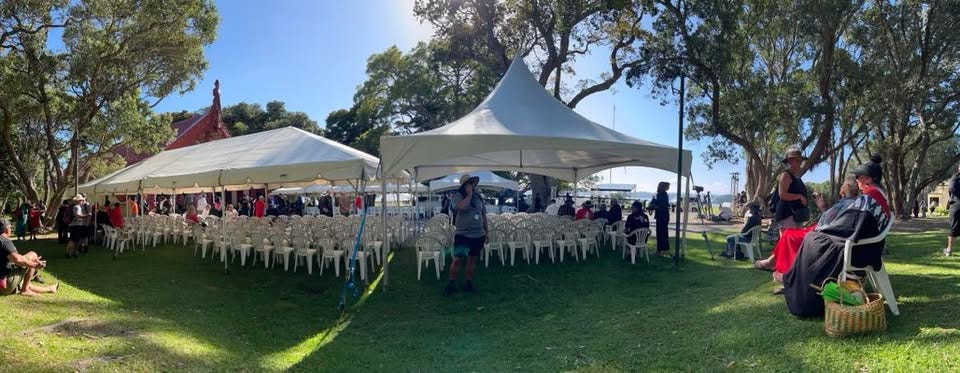
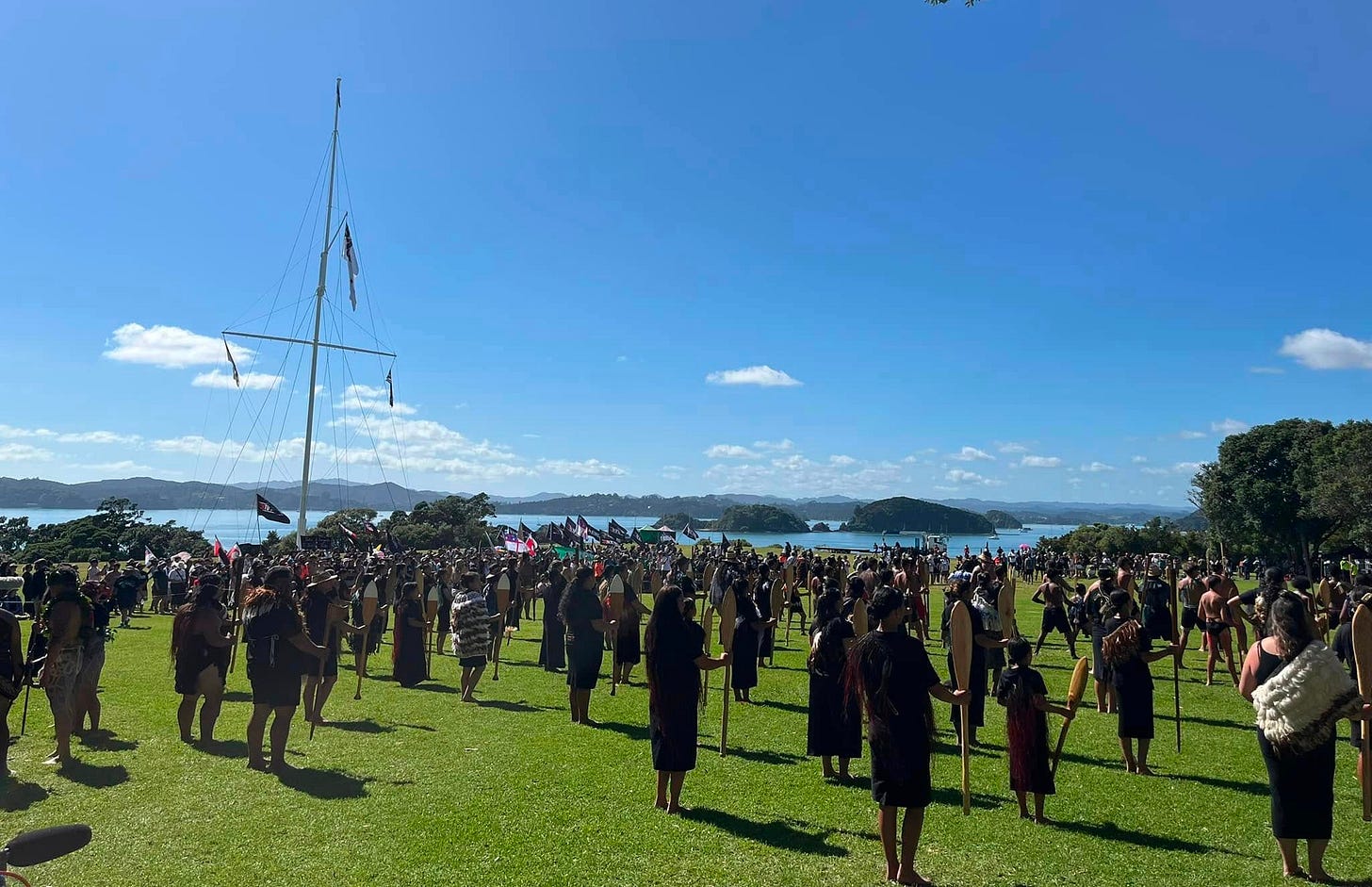
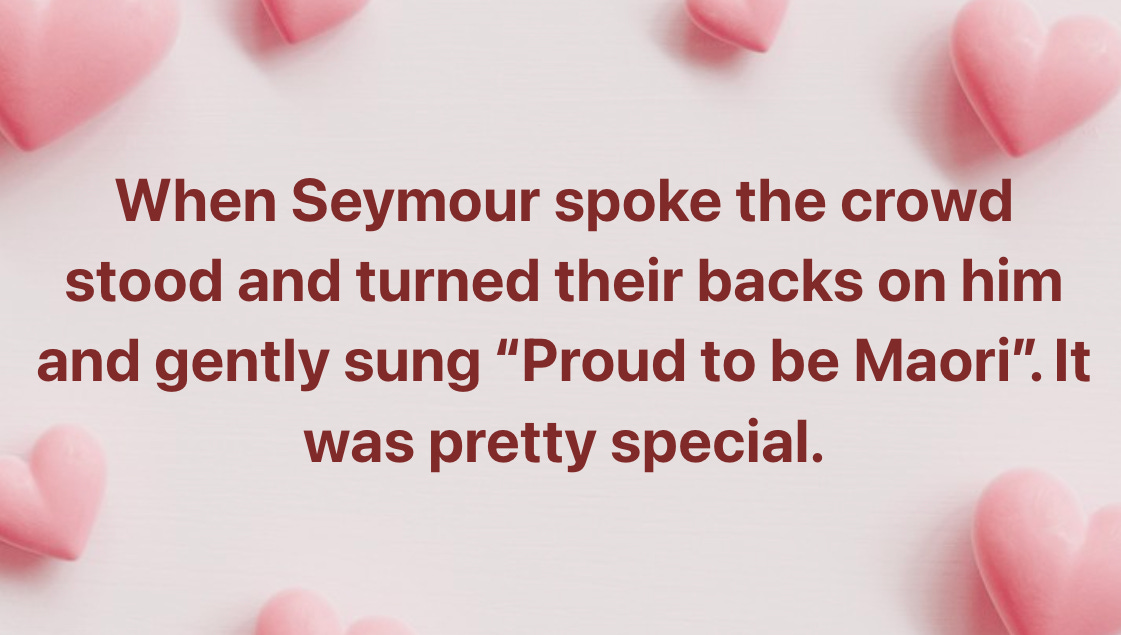
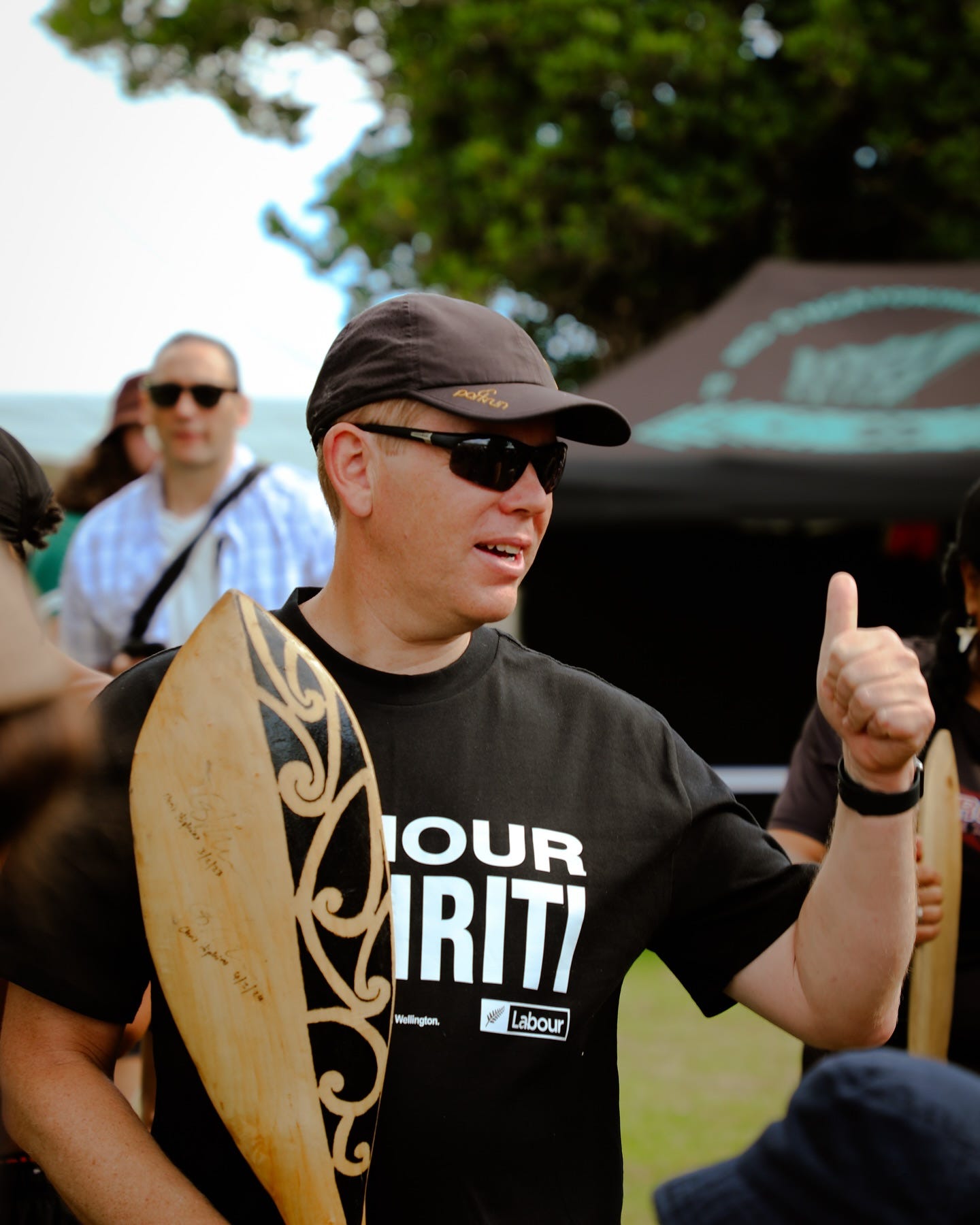
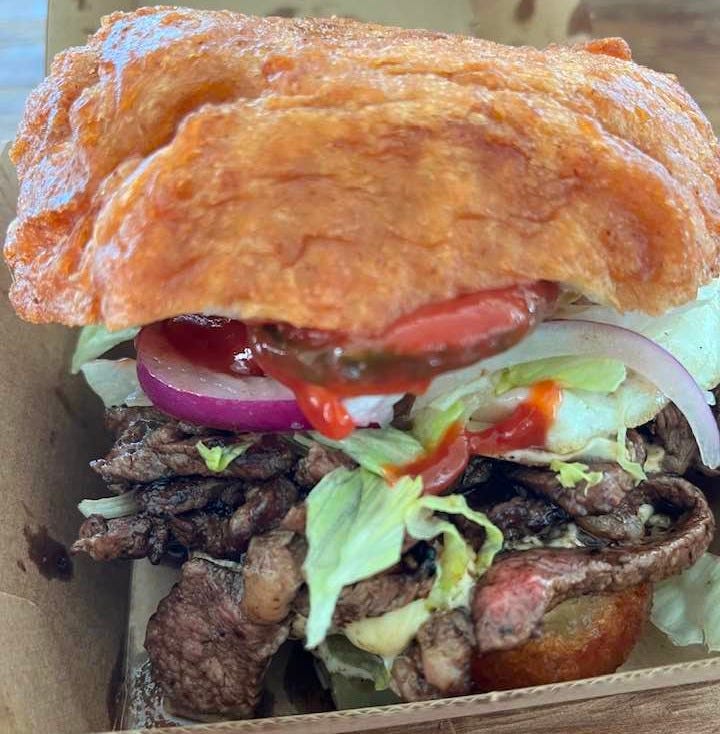
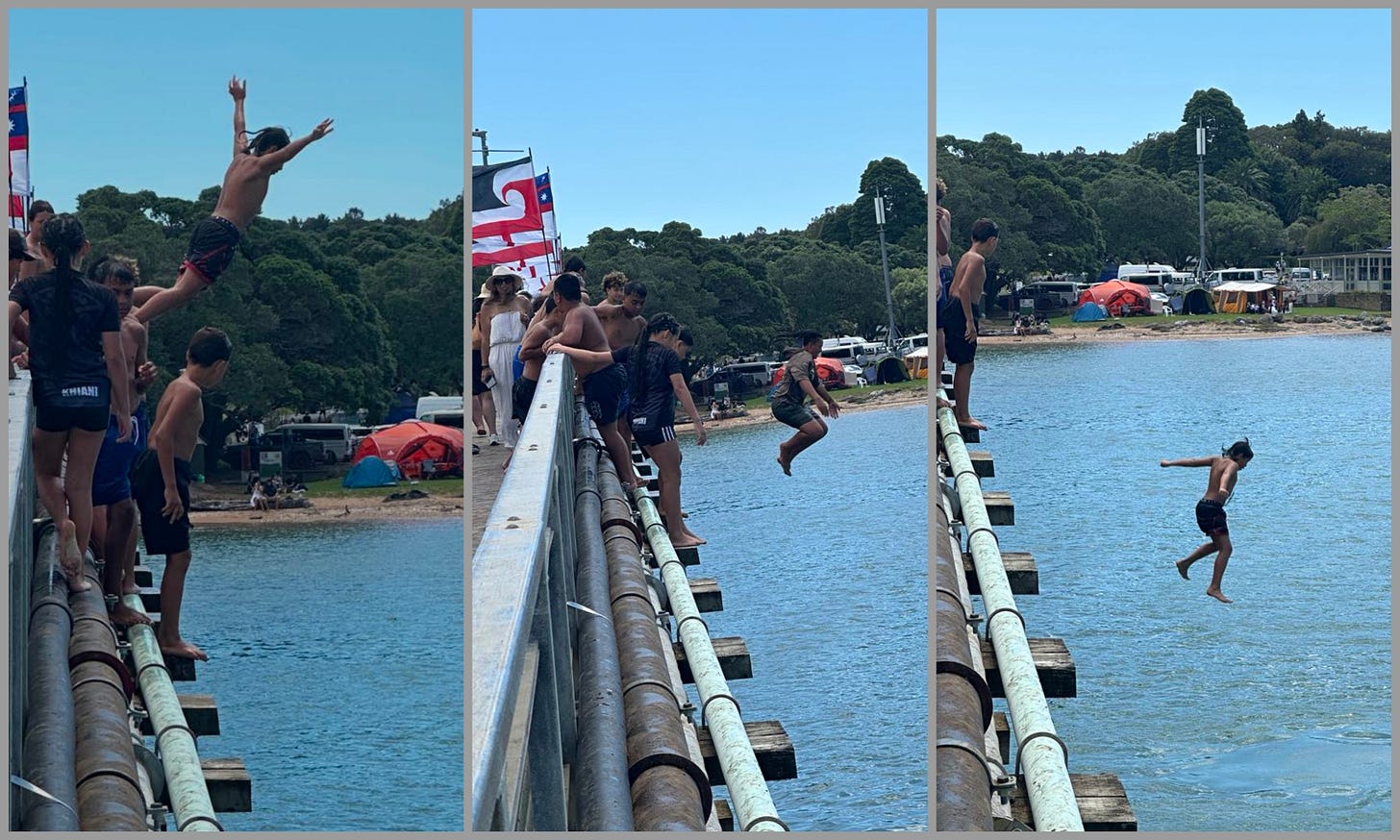
What an incredible experience, Nick. I wish I could have been there. And according to the opinion piece written by Luxon in the Herald this morning, he would have been there but it was more important for him to have a wonderful holiday in Akaroa, sauntering down memory lane where he and his brothers used to play as entitled children. But in his piece, he does mention that the treaty bill will never go through. So in short, he acknowledges that this whole fiasco has been a massive waste of our time and money. What an enormous twat.
Love this, Nick. Poignant, heartfelt, perceptive and brimming with the magic of the occasion. Toitu te tiriti!